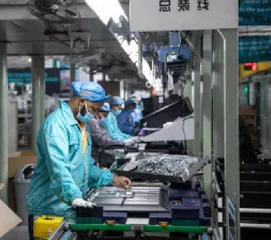Global Supply Chain Governance and the Future of Globalization
作者: Pang Zhongying

Over the past 30 years or so, globalization has been underpinned by ever-evolving supply chains. The heightened attention to supply chain issues in recent years has been due to a series of global events in the world that have had a significant and profound impact. Factors such as the COVID pandemic, the Ukraine Crisis and increased geopolitical tensions have led to supply chain crises globally or regionally.
Supply chains are closely related to globalization. Today, the adoption of protectionist supply chain strategies and policies by the United States and Western countries has led to major changes in the global supply chain, placing the global supply chain at a historic turning point. There is an urgent need for the international community to think about the future of globalization from the perspective of “chain”, and to build and improve the global supply chain governance system to empower globalization to move forward steadily.
Big Changes in the Global Supply Chain under Profound Global Transfermation
All countries are promoting supply chain diversification to avoid the compound and overlapping risks faced by supply chains. Strengthening supply chain resilience is a top priority in addressing risks. Upgrading supply chain resilience will take some time. At the same time, the linkage of domestic and foreign policy adjustments will further complicate supply chain issues.
At present, countries are planning around the supply chain and paying more and more attention to the international relations on the supply chain side. Since the Biden administration took office, it has been thinking about and responding to the supply chain problems facing the United States. The Biden administration emphasizes the vitality of the U.S. domestic economy, encourages the return of domestic supply chain enterprises, and introduces policies to attract other multinational enterprises to invest in the U.S. On November 27, 2023, Biden announced that the White House Supply Chain Resilience Council held its first meeting. Sullivan, assistant to the President for National Security Affairs noted that, “in recent decades, the U.S. supply chain for critical minerals has relied heavily on unpredictable overseas markets, many of which are dominated by China. Because of this, the Biden administration is working to build resilient, enduring supply chains with partners and allies in important areas, including semiconductors, pharmaceuticals and biotechnology, critical minerals, and batteries, so that the United States is not vulnerable to price or supply disruptions.” Sullivan has repeatedly claimed that he has had to “discuss economic issues in depth” as National Security Advisor. This means that economic issues such as supply chains have risen to the level of national security for the United States.
The German Scholz government has learned from the lessons of the great supply chain disruption and has strategically realigned Germany’s international relations on the supply chain. In July 2023, the Scholz government released its first document on “China Strategy”, which argues that Germany also needs to “diversify its supply chain”.
Supply chain issues have become a focal point for the restructuring of relations between major powers. On July 20, 2022, the U.S. and 17 economic partners held a Ministerial Forum on Supply Chains and issued a joint statement. In November 2023, the U.S. and 14 other countries signed the Indo-Pacific Economic Framework (IPEF) during the thirtieth informal meeting of the leaders of the Asia-Pacific Economic Cooperation (APEC) in San Francisco. IPEF partners signed three agreements, including the IPEF Supply Chain Agreement, to promote supply chain diversity and resilience. An important aspect of the realignment of the U.S.-EU relationship is coordination and cooperation on “critical supply chains”. The U.S. and Japan signed what is considered a “historic agreement to diversify critical supply chains and strengthen U.S.-Japan economic and trade relations,” which deepens U.S.-Japan cooperation on strategic mineral supply chains.
The main rationale for the strategic realignment of Western supply chains is de-risking. On March 30, 2023, President of the European Commission Von der Leyen first introduced the concept of de-risking in a speech on the EU’s relationship with China. In May, 2023, the Group of Seven (G7) countries signed an agreement with the U.S. and Japan to diversify key supply chains and strengthen U.S.-Japanese economic and trade relations. In May 2023, the G7 Hiroshima Summit formally included “de-risking rather than decoupling” in its joint statement, explicitly “rejecting the use of economic vulnerability as a weapon in geopolitical relations”, and calling on all countries in the world to abide by the principles of transparency, diversity, security, sustainability and reliability in the construction of goods supply chains. In fact, even before von der Leyen’s speech, the G7 and its members, including the European Union, had already widely discussed and implemented de-risking policies.
Supply Chain and Globalization
From the 1970s to the present, the recognition and study of globalization can be broadly divided into the following stages.
First, in the 1970s, the disciplines of economics and political science recognized the interdependence of nations and its importance to the world economy and world peace. However, in the context of the Cold War, interdependence was seen as occurring only within the “two parallel markets” and not between the United States and the Soviet Union. U.S.-Soviet economic ties did not reach the level of interdependence. It was on the basis of the realization of economic and technological interdependence that American international relations scholars such as Keoghan and Joseph Nye argued that world politics had entered an “era of interdependence”.